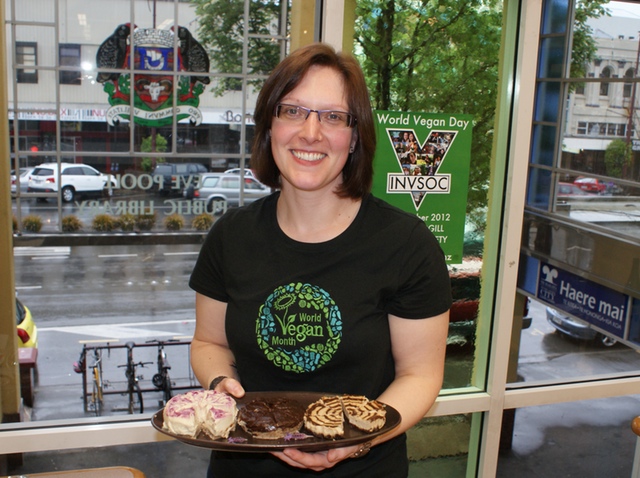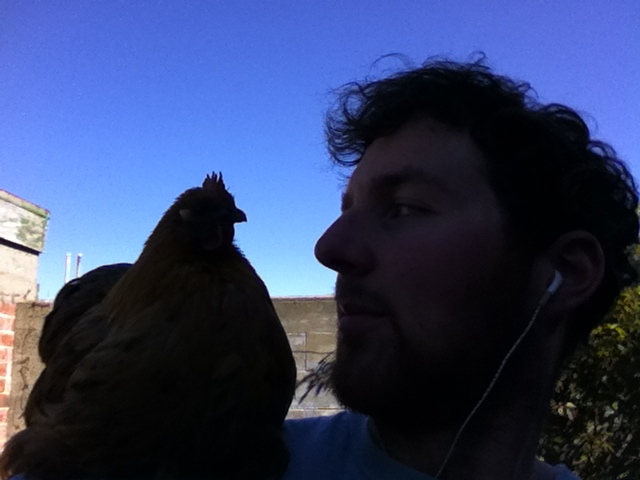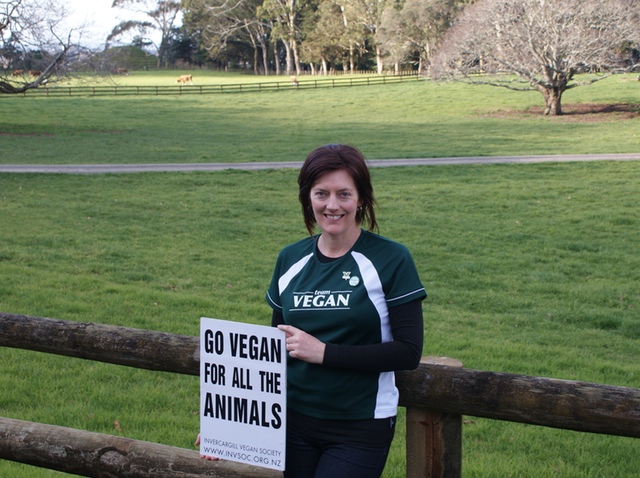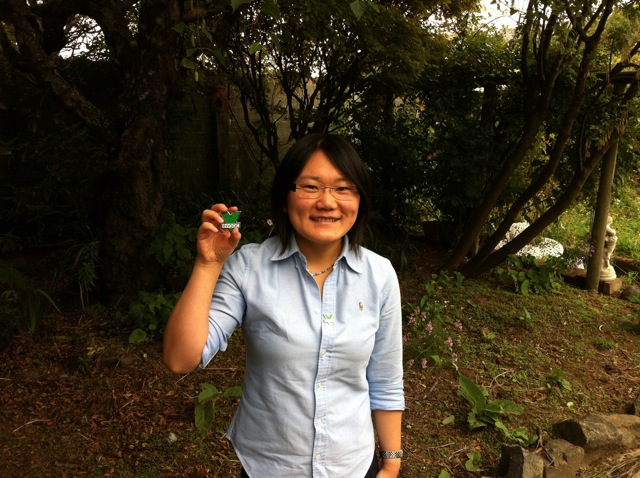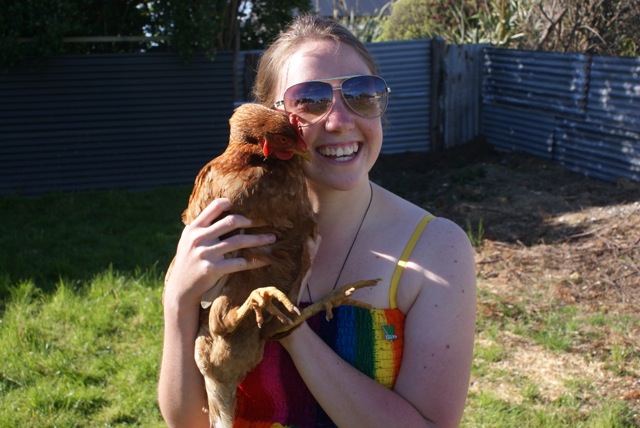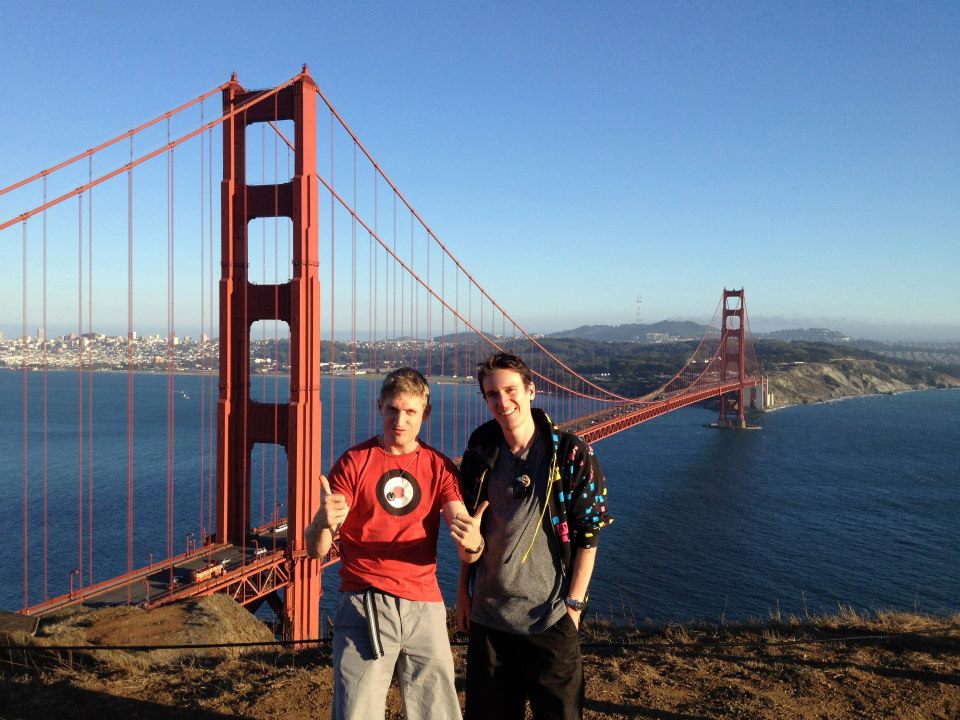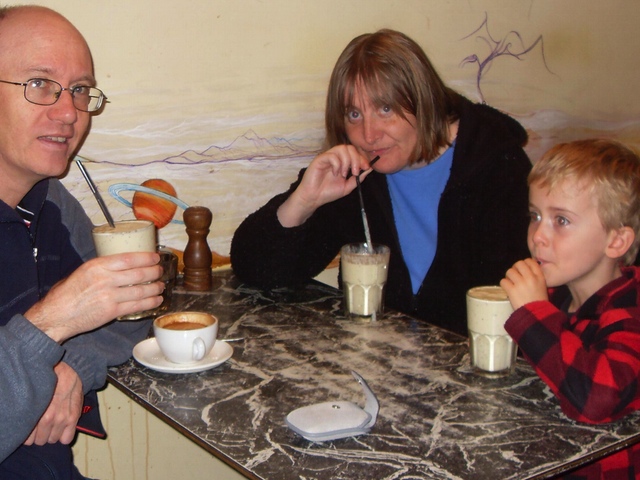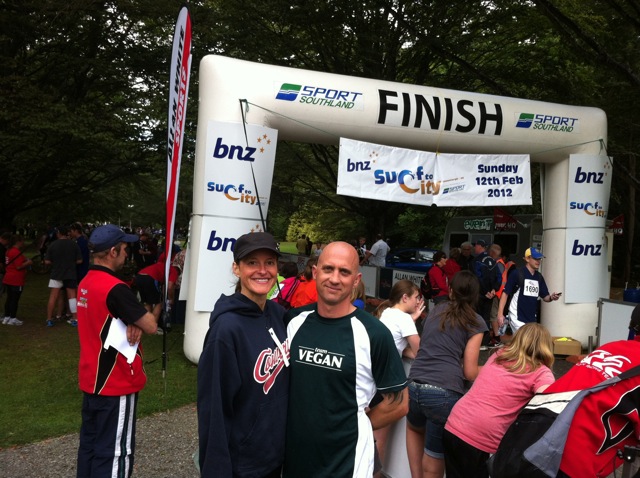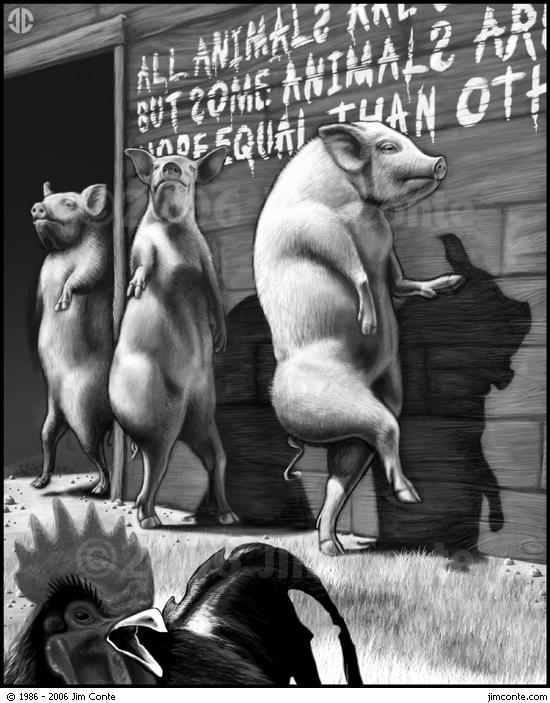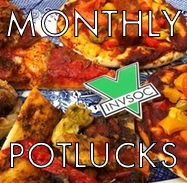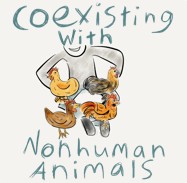“veg·an/ˈvēgən/
Noun: A person who does not eat or use animal products. ”
Veganism is more than a “diet”, we avoid harming other animals in all aspects of our lives. We don’t eat their flesh (“meat”), consume their bodily secretions (“eggs”, “milk”, “honey”), wear their skins (“leather”/”fur”, “wool”, “silk”) or support their continued exploitation in zoos, circuses, experimentation and so forth.
Check out the great Go Vegan website, their free vegan starter kit is superb!
Donald Watson
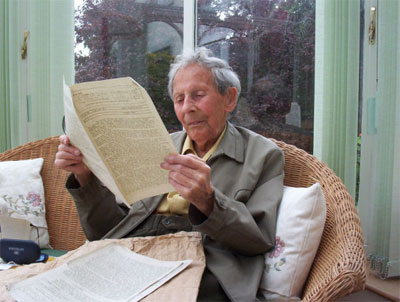 Donald Watson (2 September 1910 – 16 November 2005) was founder of the Vegan Society and inventor of the word vegan.
Donald Watson (2 September 1910 – 16 November 2005) was founder of the Vegan Society and inventor of the word vegan.
Watson was born in Mexborough, Yorkshire, into a non-vegetarian family. His journey to veganism began when he was very young, at the farm of his Uncle George. There, he says:
“I was surrounded by interesting animals. They all “gave” something: the farm horse pulled the plough, the lighter horse pulled the trap, the cows “gave” milk, the hens “gave” eggs and the cockerel was a useful “alarm clock” – I didn’t realise at that time that he had another function too. The sheep “gave” wool. I could never understand what the pigs “gave”, but they seemed such friendly creatures – always glad to see me.”
He realised what purpose the pigs served when he saw one slaughtered, and his life was changed. At the age of 14, he became a vegetarian as a New Year’s resolution, and in the 1940s, after learning about milk production, he became a vegan.
The term “vegan” was coined in England by Donald Watson, his motivation was to be ethical to sentient animals:
“We can see quite plainly that our present civilization is built on the exploitation of animals, just as past civilizations were built on the exploitation of slaves, and we believe the spiritual destiny of man is such that in time he will view with abhorrence the idea that men once fed on the products of animals’ bodies”
In 1944 he and some friends founded the Vegan Society. Someone in the group would have come up with a word to describe their diets, he believes, but he suggested “vegan”, using the first three and last two letters of “vegetarian”. It was “the beginning and end of vegetarian”, and it stuck.
At the age of 95, Watson died in his home in northern England.
Donald Watson Wikipedia entry
What makes someone decide to be Vegan?
Vegans agree that it’s not very nice to hurt or kill someone else, that we can live without using Other Animals. The United Nation’s Food and Agriculture Organisation* report that over 56 billion land animals are harmed and killed annually. Why do we hurt animals?Because we like the taste of their flesh, the parts of their body? The way their skin looks when we wear them? Because of our traditions? Invercargill Vegan Society members have decided to live vegan for many reasons, as you’ll see :-)
*2007 UN FAO statistics, marine animals are not counted individually, only by the total weight of their bodies
Katharine
“I loved animals from birth, pestered my parents for a dog from the moment I could speak, and went vegetarian aged 13, after finally making the connection between meat and animals suffering and dying. I began exploring veganism at age 19, but didn’t become vegan until my 30’s. I have found it so easy, delicious, exciting and liberating I can’t understand why I didn’t do it years ago.”
Jordan
Jordan went Vegetarian for his 2007 New Year’s Resolution, and decided to be fully Vegan a year later. “I remember The Silence of The Lambs, the bit about wearing someone else’s skin, of harming others to cut off their skin. Throughout the movie, the killer refers to other people as “it’s”, as in “IT puts the lotion on IT’s skin or else IT gets the hose again”, a degrading term, of seeing someone else as property, rather than someone, a “he” or “she”. Both the book and the movie make this point clear, of “dehumanising” someone by seeing them as a mere thing. I made the connection and realised I didn’t want to wear someone else’s skin as shoes or a jacket. We humans are animals too, mammals, and all animals deserve respect, because all animals are inherently equal.”
Jen
“I remember my mother and I watching lambs play at Auckland’s Cornwall Park (pictured) when I was about 14. We both thought they were so sweet as they jumped around amongst the daffodils. That night, our family dinner was roast lamb (!) and I thought to myself “how could I do this?!”. It made no sense to eat animals. So I became vegetarian, and after making some vegan friends, I soon decided to be vegan. My decision was re-affirmed when I heard a cow crying for her calf, the more I learnt about the dairy industry, the less I wanted to do with it. I made the connection that dairy means pain and suffering too, just like the meat industry. I have since removed all animal products from our home – because veganism is not just a diet but a lifestyle which includes items such as shoes, handbags, jackets and cleaning products.
Having competed in triathlons including an Ironman Triathlon, I have no doubt that being vegan is great for athletic performance and general health. As an Invercargill Vegan Society member, I enjoy the annual 12km Surf to City funrun. You are welcome to join us, INVSOC’s Team Vegan :-)
2012 Jordan, Russell, Noelle
2013 Jordan, Jen, Steph, Christina
We are all becoming aware of global warming, the need to use land more efficiently and to conserve water. Being vegan addresses all these issues and more.
I am vegan to end the suffering of other animals, although it is great to know that in doing so we are also improving our own health, and the health of the planet.”
Dan
“I went vegetarian when I was 15, and as I got more informed about the dairy industry and impact on the environment, I progressed to veganism when I was about 21. It got harder and harder to explain why dairy is OK and eggs are not the more I delved into it.”
Hannah
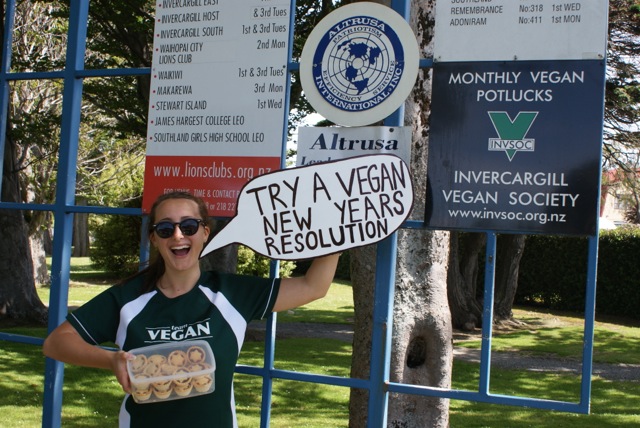
“My journey to veganism began in 2010 when I visited Cambodia. It was the first time I had seen meat that still resembled the animal, and seeing marketplaces full of flesh from pig to dog to duck truly shocked me, and made me really consider stepping out from meat eating.
Once I got home it was the beginning of November and I thought, let’s go vegetarian for the month – it’s been over four years now.
I received my fair share of ridicule in that first year, which helped to drive me to find out more about vegetarianism and veganism. The more documentaries I watched and books I read, the more convinced I was that veganism made sense for me on every level.
In 2011 I was vegan as much as I could, and this pattern persisted for much of the next 3 years. I would always be vegan when I was choosing or preparing my own food, but when someone had cooked for me (especially when I was travelling), I found it really hard to ask for vegan food, when they were already making comments about what to feed a vegetarian.
When I came back home in October 2014, I was astonished to be told by Mum that there was a vegan society in Invercargill, New Zealand! (A small rural based city of 50,000)
I went along to their World Vegan Day Potluck on November 1st, (on my 4 year vegetarian anniversary no less) and made the resolution to be vegan no matter what situation I find myself in.
I’ve learned too much over the past four years about animal cruelty, human health and sustainability to ever go back. Veganism is my present and my future.”
Steph
“It was the aftermath of Christmas 2010, and my 19 year old self had happily joined in the family tradition of consuming an enormous leg of ham over the festive season. It was a day or two after Boxing Day, and I was parked on the couch watching telly, still digesting from the Christmas binge and begrudgingly accepting that the price of delicious food was banishing my bikini to the back of the drawer for yet another summer. By chance, “Charlotte’s Web” was the afternoon movie, and I certainly had nothing better to do than watch a talking pig run around a farmyard.
My dad wandered into the living room around the same time that adorable little Wilbur was figuring out that he was going to be eaten. I was outraged, because this pig had feelings, and he was cute, and what right did they have to eat him, really, when they didn’t need to? I said all this to my father, which swiftly turned into a tirade about how cruel animal farming is. He defended the practice, which only served to infuriate me, and we had what quickly became a very heated argument about animal rights. He told me I was being a hypocrite, since I was part of the system, and had been creating a market for the practice my whole life. I ate animals, and therefore my argument was hollow.
He was right, and I hated that I had no ground to stand on.
I declared, on that sofa, still digesting ham, with Wilbur running around on the screen in front of me, that I was going to go vegetarian. I wasn’t really sure how serious I was. My track record with staying power was not terribly promising. My father scoffed, and a sudden flash of stubbornness flared up inside me.
I spent the evening researching the plausibility of becoming a vegetarian. I was still prey to the unfounded claim that I would be protein deficient, and anaemic, and my health would spiral out of control if I wasn’t careful. That evening I also came across issues that had never crossed my mind before. What was wrong with drinking milk, after all? Surely the egg industry couldn’t be so terrible if it was legal? My curiosity provided me with questions and answers that I was not comfortable with at all. Vegetarianism suddenly wasn’t enough. Go big, or go home, right? The vegan train had arrived at the station.
I felt incredibly guilty, and suddenly, the taste of meat or cheese or a chocolate milkshake didn’t matter anymore. My resolve to prove my father wrong out of stubbornness was replaced with this incredible drive to be a better person. It was in my power to do so, and I decided to actually become the change I wished to see in the world. I became a vegan at the stroke of midnight on New Years’ Eve, going cold tofurkey from my previous meat-loving existence. Now nearly three years on, my life has changed in the most wonderfully unexpected ways. I am in tune with my body in ways I didn’t know existed, I have met the most incredibly inspiring people, and the joy and peace I now feel with the natural world makes me wish this lifestyle had been thrust upon me from birth.”
Luke
“I became vegetarian at the age of 4. [note from the editor: no, not 14, age four!] Not because my parents were but mostly because of a pet. One of my uncles is a sheep farmer up in the Hawke’s Bay and gave me and my little sister a lamb. I remember mixing up the milk and feeding them from a bottle and all that. But you couldn’t have a full-grown sheep living in the middle of the city even back in those days so eventually it came time to send her back up to the farm.
Somehow my parents let slip that she could end up on our dinner plate with mint sauce at some stage, and so I swore off meat for good. Also when I grew up it was back in the times where instead of going to the supermarket, every little suburb in Wellington would have its own butcher and baker etc. The bakery we had doubled as some kind of convenience store or dairy so we stopped outside there pretty often. It happened to be next to the butchery and on numerous occasions I remember watching the meat truck pull up and open its doors at the back to unload in front of us with these massive headless carcasses swinging back and forth. That didn’t help!
Anyhow, back in 1980s New Zealand being vegetarian was probably about as common as a home without a Michael Jackson record, so my parents were naturally concerned for my health. So they made a compromise with me, that I would still eat fish, because they ‘weren’t really animals.’ I didn’t like eating fish though, so I probably only had it at most once a week. I kept eating eggs and fish and dairy products, particularly during my teenage years when I also fell victim to the popular myth that these were good sources of ‘protein’ that would otherwise be lacking in a vegetarian diet. I even used to take whey protein religiously following my workouts.
But my passion for science and reading brought about the removal of the remaining animal products in my diet, approximately 2 years ago now: I read T. Colin Campbell’s “The China Study“, then Dr Caldwell Esselstyn’s “Prevent and Reverse Heart Disease“, then Jonathan Safran Foer’s “Eating Animals” (which converted Natalie Portman from vegetarianism to veganism). I also met Dr Esselstyn and his wife Ann at a conference in Rotorua and realised that their diet was a possibility in New Zealand. So in the end what I learned is that avoiding animal products entirely is not only possible, it’s actually healthier and better for the environment, as well as being kinder to our fellow beings.”
Kerri
Kerri went vegetarian aged 17. On a student exchange overseas, she was told she was eating horse meat. That made her think about why she was happy to eat some animals but not others, and she couldn’t come up with a good reason that would let her sleep at night, so the last flesh she ever ate was that horse. A little over 10 years later she had explored all the vegetarian cookbooks in her small-town library and borrowed the only vegan cookbook. At this point she thought vegans were too extreme, but maybe there might be a good recipe or two in the book. She read the introduction, with all the reasons for becoming vegan and was horrified that she’d never stopped to think what happened to the male chicks, or how it must be for poor cows to be milkmaking machines, etc. She read it to her husband, Steve (since they’d been together he’d been vegetarian at home but ate meat when out) and he agreed that going vegan was the only option. They thought it would be too hard to give up cheese and all the other goodies, but threw everything out so they could start afresh. They soon discovered that being vegan led to them being more creative and adventurous in the kitchen, and have never missed animal products.

